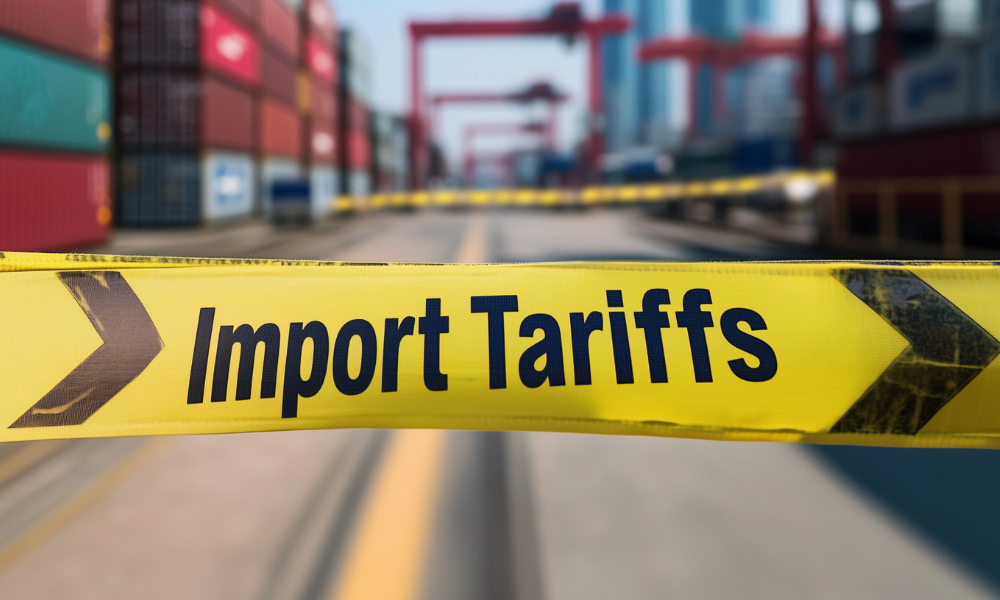Foreign Affairs minister says Canada must prepare for all scenarios as Trump moves ahead with tariffs on Canadian goods

Foreign Affairs Minister Mélanie Joly said Canada must “fight back” after US President Donald Trump confirmed that tariffs on Canadian and Mexican imports will take effect next week.
According to BNN Bloomberg, Trump stated at a White House press conference with French President Emmanuel Macron that the tariffs are moving forward “on time, on schedule.”
Trump’s executive order, which includes a 25 percent tariff on all Canadian imports and a 10 percent levy on Canadian energy products, was initially delayed until March 4.
The delay followed Canada’s agreement to introduce new border security measures.
While the order was originally tied to fentanyl trafficking, Trump previously said the pause allowed time to negotiate a “final economic deal.”
Prime Minister Justin Trudeau spoke with Trump by phone on Saturday before a virtual G7 meeting.
As per the Prime Minister’s Office, their conversation focused mainly on Ukraine, but Trudeau also provided an update on Canada’s border efforts to counter fentanyl trafficking.
Canadian federal ministers and premiers have travelled to Washington in recent weeks to determine what could persuade Trump to drop his tariff plans.
Despite this diplomatic push, according to BNN Bloomberg, it remains unclear what the US president wants in exchange for permanently removing the threat of tariffs.
Joly, speaking to reporters from London, said Canada must be ready for all possibilities given Trump’s unpredictability.
“We need to be aware that the threat of tariffs is a real one and may continue for a while,” she said, emphasizing that Canada must send a strong message that it “will fight back.”
She added that Canada has received positive feedback from US officials about its border security efforts.
According to US Customs and Border Protection data, illegal crossings of people and drugs from Canada into the US remain minimal compared to the numbers at the US-Mexico border.
Joly pointed out that the US is a net exporter of guns, migrants, and drugs to Canada, highlighting the need for coordinated action.
Canada has promised to retaliate with levies on billions of dollars worth of US goods if the tariffs take effect. Trump, in his first month back in office, has expanded his tariff agenda.
He signed an executive order on February 1 imposing a 25 percent tariff on Canadian and Mexican imports and a 10 percent duty on Canadian energy.
He later announced on Truth Social that the tariffs on Canadian goods would be paused for 30 days, while duties on Mexican imports would be postponed for one month to allow time for negotiations.
Trump has defended his approach, arguing that the US has “been taken advantage of” on trade. “So, the tariffs will go forward, yes, and we’re going to make up a lot of territory,” he told reporters.
His trade policies extend beyond Canada and Mexico. Trump ordered a 25 percent tariff on all steel and aluminum imports from Canada starting March 12.
He also proposed tariffs on automobiles and forest products in April.
Additionally, he imposed a 10 percent tariff on Chinese imports and announced a plan for “reciprocal tariffs.” China has already responded with its own retaliatory tariffs, raising concerns about escalating trade tensions.
Experts and Canadian leaders suggest that Trump’s tariff threats may be a negotiating tactic ahead of the mandatory 2026 review of the Canada-US-Mexico Agreement, which replaced NAFTA.
Joly stressed the importance of working with allies to develop a strong, coordinated response, stating, “It is important that allies under that threat work together and work as a coalition by having the same types of countermeasures.”
While diplomatic efforts continue, Canada is preparing for all outcomes, including the possibility of retaliatory action.



